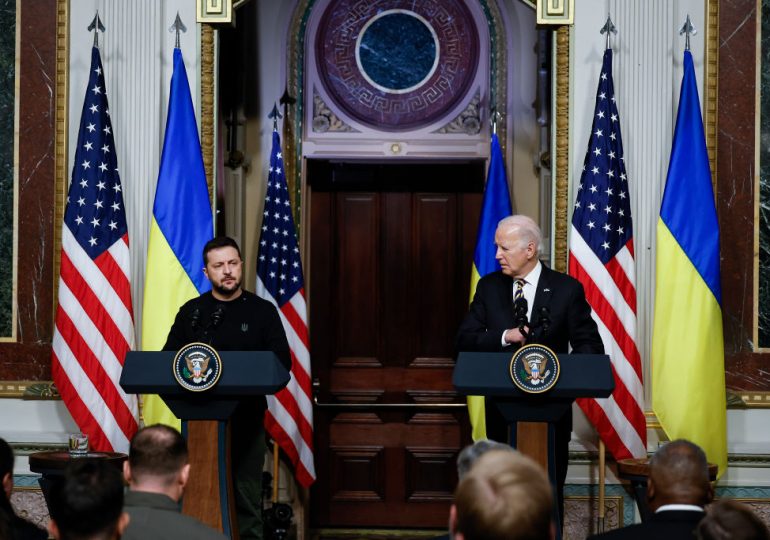Senate negotiators and the White House are scrambling to strike a last-minute deal on a framework for border policy changes that Republicans have demanded in exchange for approving billions in military aid for Ukraine.
[time-brightcove not-tgx=”true”]
But such a deal appears unlikely to come together before Senators leave town for the holidays later this week. Lawmakers on both sides of the aisle have voiced skepticism about reaching a deal and progressive Democrats have raised concerns that the White House may be yielding to conservative pressures.
The complex negotiations, triggered by Senate Republicans blocking a $110.5 billion foreign-aid bill earlier this month, have become a high-stakes challenge for lawmakers and President Joe Biden as the U.S. is set to run out of funding to provide more weapons and equipment to Ukraine by the end of the year.
“We’ve got lots of issues to work through, in which there are many different ways to try and address and solve problems,” Arizona Sen. Kyrsten Sinema, an Independent who has been negotiating the border deal, told reporters on Sunday. “We have to choose the one that works the best and that allows us to earn the votes of both houses [of Congress] and both parties.”
Negotiating Senators met for three hours on Sunday—including a visit from Homeland Security Secretary Alejandro Mayorkas—but a concrete framework is yet to emerge. Sinema signaled that certain aspects of the border language had been settled, while Sen. James Lankford of Oklahoma, the top Republican in the border negotiations, said it wasn’t clear whether the Senate will vote on the package this week, adding that a meeting to discuss the legislation will likely take place when the House returns the week of January 8.
At the center of the debate, Republicans want stricter border security measures, including tightened restrictions on asylum-seekers and the reintroduction of some Trump-era immigration policies, in exchange for approving additional funding to Ukraine, which Biden and Democrats want. As talks continue, Republicans claim Democrats are rushing the legislation, while progressive Democrats have raised objections over perceived concessions to conservative demands, highlighting the delicate balancing act required to navigate the diverse interests within Congress. “No backroom deal on the border without the involvement of the House, the House Hispanic caucus, Latino senators, is going to pass,” California Rep. Ro Khanna, a Democrat, said on Fox News Sunday.
Democrats have conceded to certain Republican requests, such as elevating the criteria for asylum-seekers to establish a credible fear of persecution upon return to their home countries. But they have opposed suggestions to reintroduce Trump-era policies mandating family detention and reinstating a mandate for migrants unable to be detained to wait outside the U.S. for their immigration court hearing. Democrats also resist a proposal to broaden expedited removal proceedings, wherein migrants are deported before having the chance to make asylum claims, on a nationwide scale.
South Carolina Sen. Lindsey Graham, a Republican, said on NBC’s Meet the Press on Sunday that Democrats and Republicans are “not anywhere close to a deal” on U.S. southern border policy changes. “The bottom line here is we feel like we’re being jammed,” he said. “I will not help Ukraine, Taiwan, or Israel until we secure a border that’s been obliterated.”
Texas Sen. John Cornyn, a Republican, expressed a similar stance on Fox News Sunday. “I talked to a couple of key negotiators yesterday,” he said. “They feel like they are making some progress, but I know Sen. Schumer thinks there is going to be a deal cut behind closed doors and then jam it through the Senate and then jam the House. That’s not going to happen. But we are making some progress.”
Last week, just after Ukrainian President Volodymyr Zelensky delivered an impassioned appeal to lawmakers, Biden accused Republicans of holding Ukraine funding as a bargaining chip to advance “extreme” demands on the southern border. Zelensky left Washington empty-handed, as his plea did not appear to alter the perception among some Republicans that addressing the U.S. border crisis must coincide with aid for Ukraine. Even if the Senate does agree to a deal, it would face another obstacle in the Republican-led House, which has been more reluctant to approve funding for Ukraine.
John Kirby, a White House spokesperson for national security issues, announced on Monday that the White House is set to release another package of military aid for Ukraine before the end of the month, though it could be the final one until Congress approves additional funds, he said.
Leave a comment
















